Ethical Issues Tied to IVF
VerifiedAdded on 2023/01/19
|9
|2635
|27
AI Summary
This article explores the ethical issues tied to in vitro fertilization (IVF), including advantages, disadvantages, and ethical approaches. It discusses the impact of IVF on the community, the infertile couple, the offspring, and the pre-embryo.
Contribute Materials
Your contribution can guide someone’s learning journey. Share your
documents today.
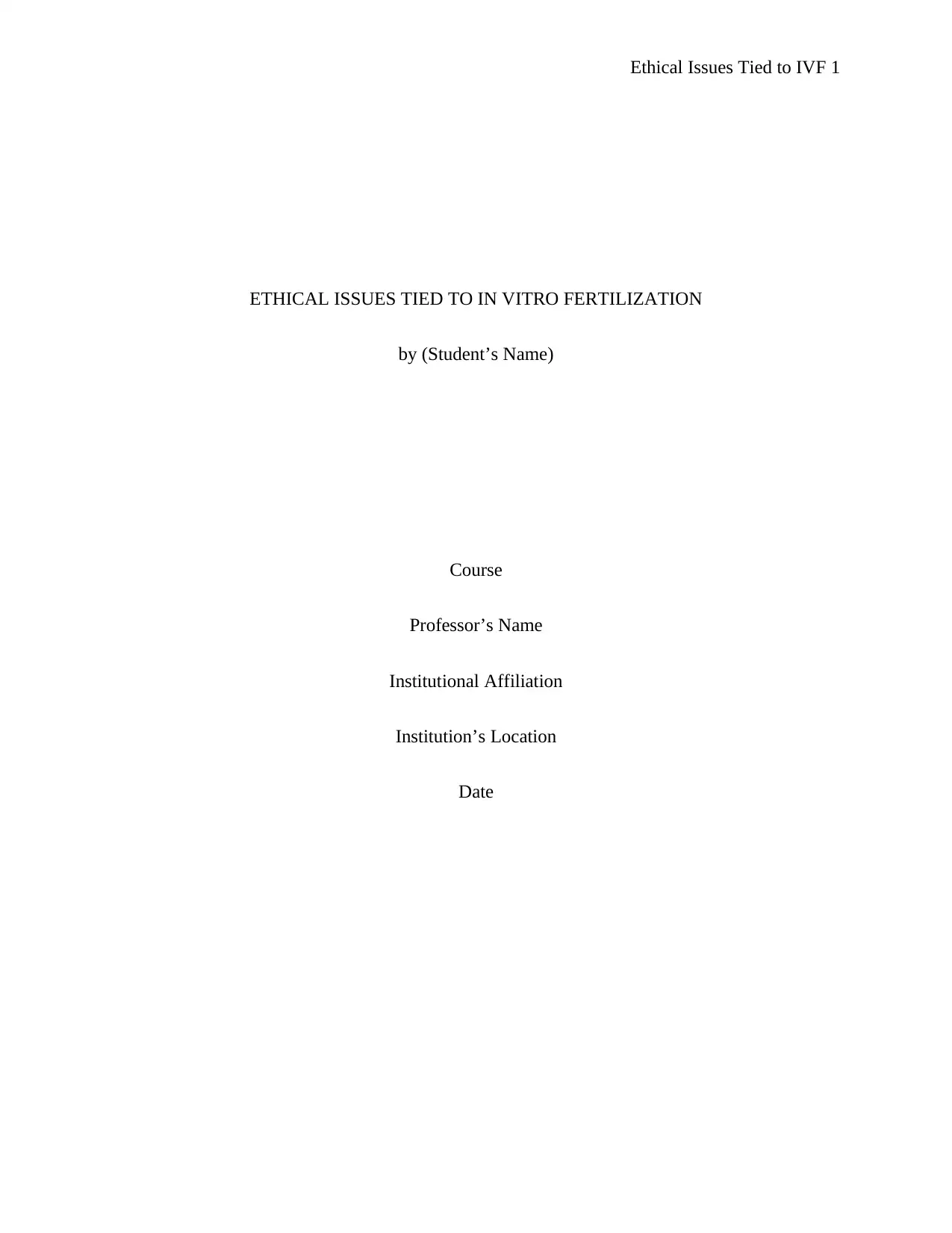
Ethical Issues Tied to IVF 1
ETHICAL ISSUES TIED TO IN VITRO FERTILIZATION
by (Student’s Name)
Course
Professor’s Name
Institutional Affiliation
Institution’s Location
Date
ETHICAL ISSUES TIED TO IN VITRO FERTILIZATION
by (Student’s Name)
Course
Professor’s Name
Institutional Affiliation
Institution’s Location
Date
Secure Best Marks with AI Grader
Need help grading? Try our AI Grader for instant feedback on your assignments.
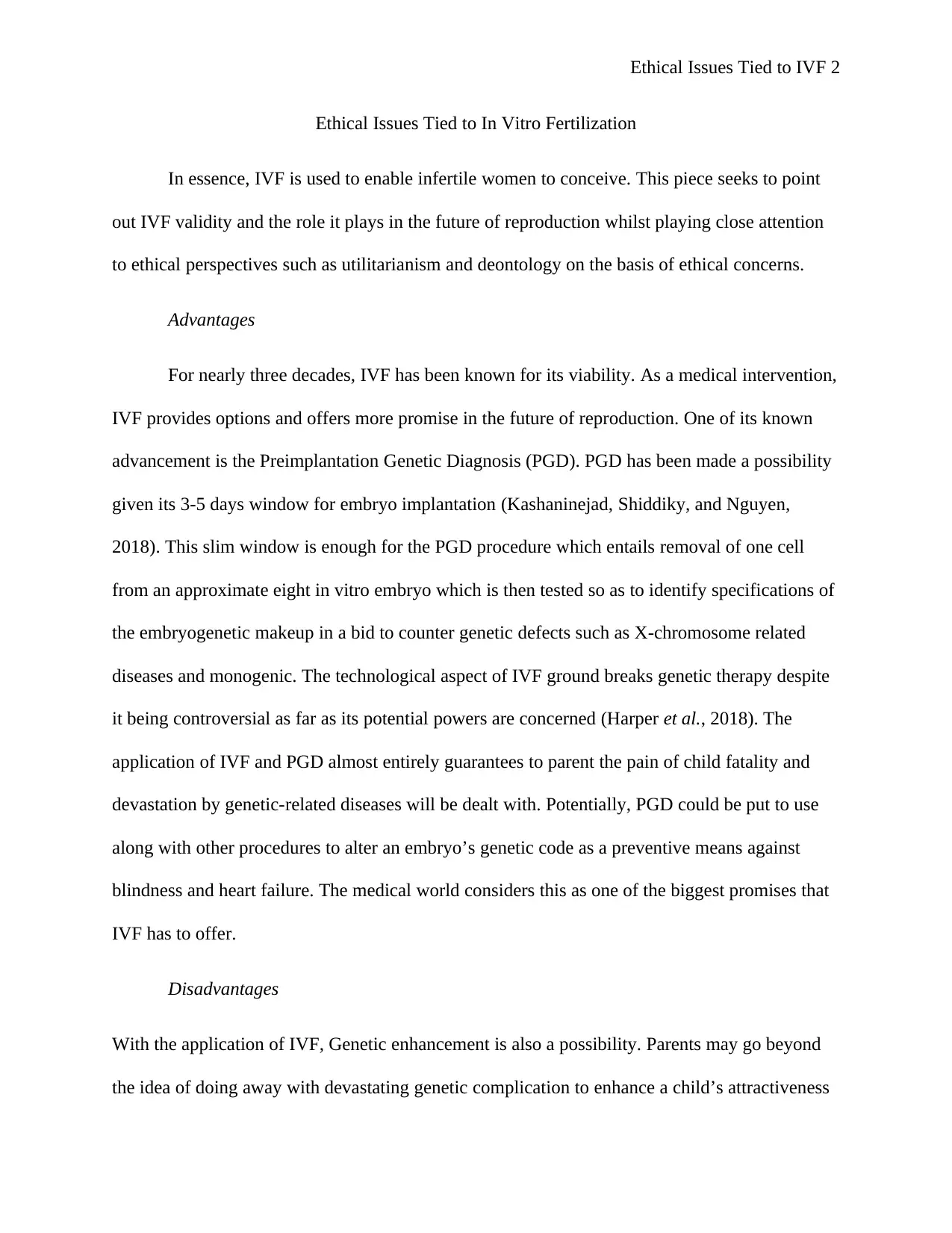
Ethical Issues Tied to IVF 2
Ethical Issues Tied to In Vitro Fertilization
In essence, IVF is used to enable infertile women to conceive. This piece seeks to point
out IVF validity and the role it plays in the future of reproduction whilst playing close attention
to ethical perspectives such as utilitarianism and deontology on the basis of ethical concerns.
Advantages
For nearly three decades, IVF has been known for its viability. As a medical intervention,
IVF provides options and offers more promise in the future of reproduction. One of its known
advancement is the Preimplantation Genetic Diagnosis (PGD). PGD has been made a possibility
given its 3-5 days window for embryo implantation (Kashaninejad, Shiddiky, and Nguyen,
2018). This slim window is enough for the PGD procedure which entails removal of one cell
from an approximate eight in vitro embryo which is then tested so as to identify specifications of
the embryogenetic makeup in a bid to counter genetic defects such as X-chromosome related
diseases and monogenic. The technological aspect of IVF ground breaks genetic therapy despite
it being controversial as far as its potential powers are concerned (Harper et al., 2018). The
application of IVF and PGD almost entirely guarantees to parent the pain of child fatality and
devastation by genetic-related diseases will be dealt with. Potentially, PGD could be put to use
along with other procedures to alter an embryo’s genetic code as a preventive means against
blindness and heart failure. The medical world considers this as one of the biggest promises that
IVF has to offer.
Disadvantages
With the application of IVF, Genetic enhancement is also a possibility. Parents may go beyond
the idea of doing away with devastating genetic complication to enhance a child’s attractiveness
Ethical Issues Tied to In Vitro Fertilization
In essence, IVF is used to enable infertile women to conceive. This piece seeks to point
out IVF validity and the role it plays in the future of reproduction whilst playing close attention
to ethical perspectives such as utilitarianism and deontology on the basis of ethical concerns.
Advantages
For nearly three decades, IVF has been known for its viability. As a medical intervention,
IVF provides options and offers more promise in the future of reproduction. One of its known
advancement is the Preimplantation Genetic Diagnosis (PGD). PGD has been made a possibility
given its 3-5 days window for embryo implantation (Kashaninejad, Shiddiky, and Nguyen,
2018). This slim window is enough for the PGD procedure which entails removal of one cell
from an approximate eight in vitro embryo which is then tested so as to identify specifications of
the embryogenetic makeup in a bid to counter genetic defects such as X-chromosome related
diseases and monogenic. The technological aspect of IVF ground breaks genetic therapy despite
it being controversial as far as its potential powers are concerned (Harper et al., 2018). The
application of IVF and PGD almost entirely guarantees to parent the pain of child fatality and
devastation by genetic-related diseases will be dealt with. Potentially, PGD could be put to use
along with other procedures to alter an embryo’s genetic code as a preventive means against
blindness and heart failure. The medical world considers this as one of the biggest promises that
IVF has to offer.
Disadvantages
With the application of IVF, Genetic enhancement is also a possibility. Parents may go beyond
the idea of doing away with devastating genetic complication to enhance a child’s attractiveness
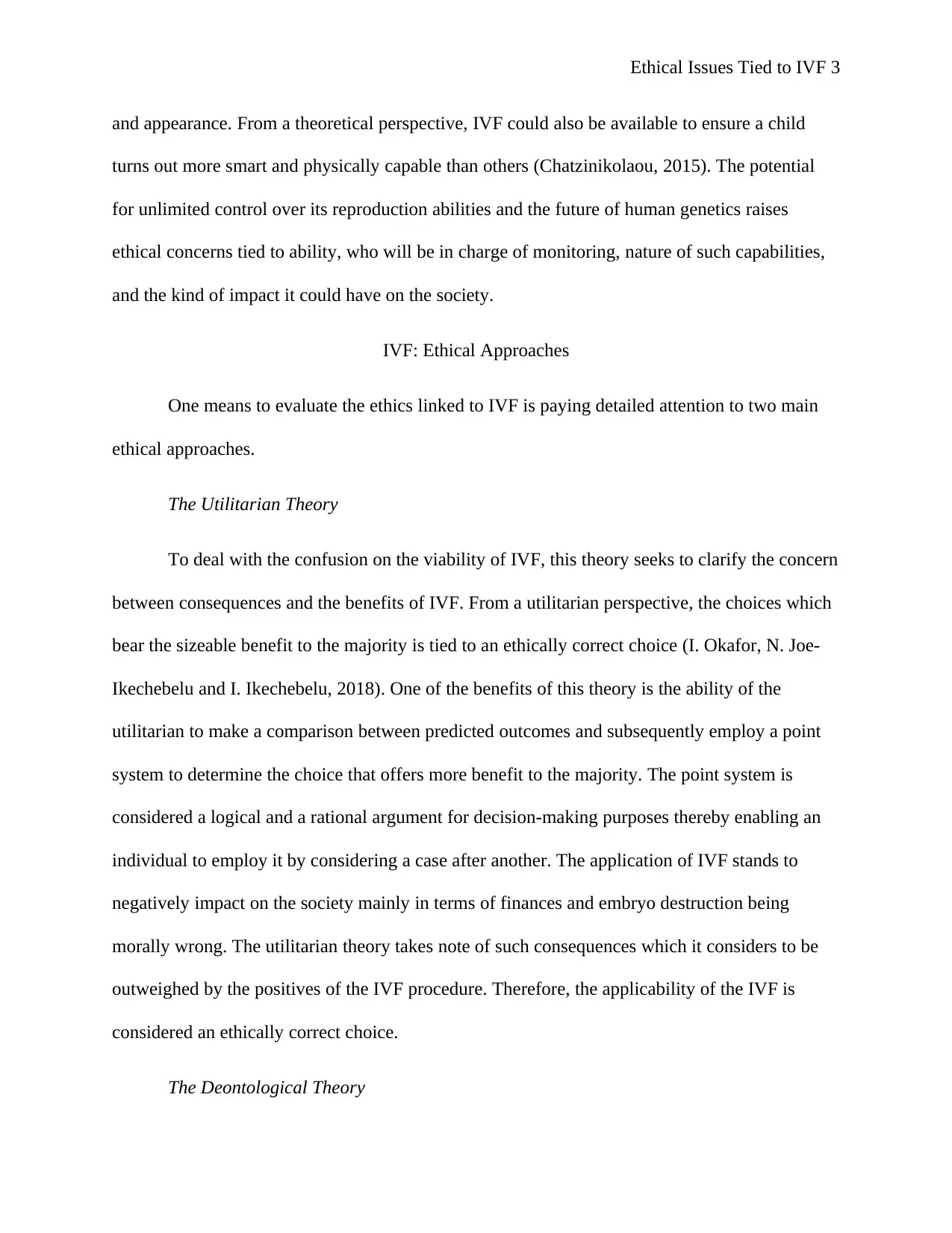
Ethical Issues Tied to IVF 3
and appearance. From a theoretical perspective, IVF could also be available to ensure a child
turns out more smart and physically capable than others (Chatzinikolaou, 2015). The potential
for unlimited control over its reproduction abilities and the future of human genetics raises
ethical concerns tied to ability, who will be in charge of monitoring, nature of such capabilities,
and the kind of impact it could have on the society.
IVF: Ethical Approaches
One means to evaluate the ethics linked to IVF is paying detailed attention to two main
ethical approaches.
The Utilitarian Theory
To deal with the confusion on the viability of IVF, this theory seeks to clarify the concern
between consequences and the benefits of IVF. From a utilitarian perspective, the choices which
bear the sizeable benefit to the majority is tied to an ethically correct choice (I. Okafor, N. Joe-
Ikechebelu and I. Ikechebelu, 2018). One of the benefits of this theory is the ability of the
utilitarian to make a comparison between predicted outcomes and subsequently employ a point
system to determine the choice that offers more benefit to the majority. The point system is
considered a logical and a rational argument for decision-making purposes thereby enabling an
individual to employ it by considering a case after another. The application of IVF stands to
negatively impact on the society mainly in terms of finances and embryo destruction being
morally wrong. The utilitarian theory takes note of such consequences which it considers to be
outweighed by the positives of the IVF procedure. Therefore, the applicability of the IVF is
considered an ethically correct choice.
The Deontological Theory
and appearance. From a theoretical perspective, IVF could also be available to ensure a child
turns out more smart and physically capable than others (Chatzinikolaou, 2015). The potential
for unlimited control over its reproduction abilities and the future of human genetics raises
ethical concerns tied to ability, who will be in charge of monitoring, nature of such capabilities,
and the kind of impact it could have on the society.
IVF: Ethical Approaches
One means to evaluate the ethics linked to IVF is paying detailed attention to two main
ethical approaches.
The Utilitarian Theory
To deal with the confusion on the viability of IVF, this theory seeks to clarify the concern
between consequences and the benefits of IVF. From a utilitarian perspective, the choices which
bear the sizeable benefit to the majority is tied to an ethically correct choice (I. Okafor, N. Joe-
Ikechebelu and I. Ikechebelu, 2018). One of the benefits of this theory is the ability of the
utilitarian to make a comparison between predicted outcomes and subsequently employ a point
system to determine the choice that offers more benefit to the majority. The point system is
considered a logical and a rational argument for decision-making purposes thereby enabling an
individual to employ it by considering a case after another. The application of IVF stands to
negatively impact on the society mainly in terms of finances and embryo destruction being
morally wrong. The utilitarian theory takes note of such consequences which it considers to be
outweighed by the positives of the IVF procedure. Therefore, the applicability of the IVF is
considered an ethically correct choice.
The Deontological Theory
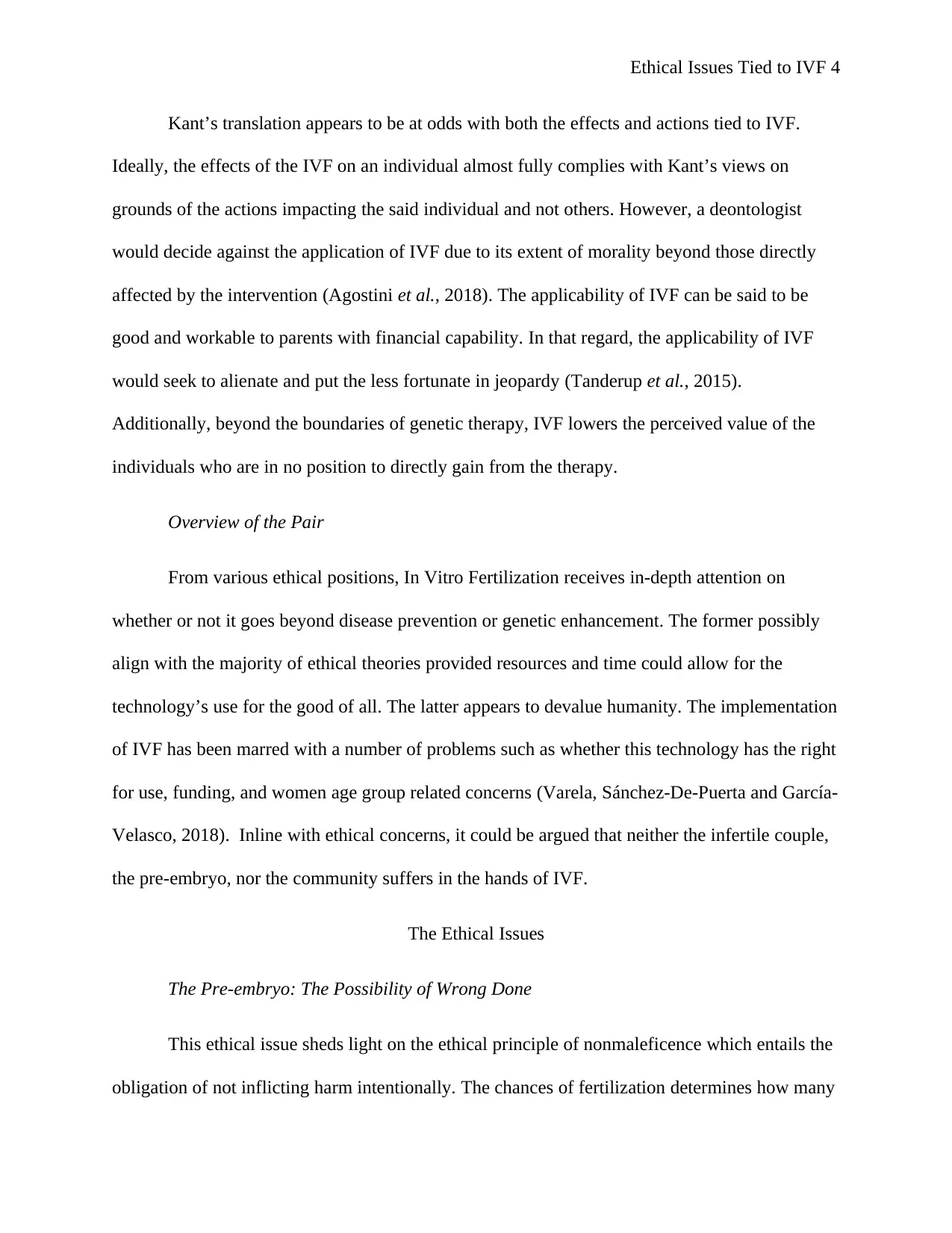
Ethical Issues Tied to IVF 4
Kant’s translation appears to be at odds with both the effects and actions tied to IVF.
Ideally, the effects of the IVF on an individual almost fully complies with Kant’s views on
grounds of the actions impacting the said individual and not others. However, a deontologist
would decide against the application of IVF due to its extent of morality beyond those directly
affected by the intervention (Agostini et al., 2018). The applicability of IVF can be said to be
good and workable to parents with financial capability. In that regard, the applicability of IVF
would seek to alienate and put the less fortunate in jeopardy (Tanderup et al., 2015).
Additionally, beyond the boundaries of genetic therapy, IVF lowers the perceived value of the
individuals who are in no position to directly gain from the therapy.
Overview of the Pair
From various ethical positions, In Vitro Fertilization receives in-depth attention on
whether or not it goes beyond disease prevention or genetic enhancement. The former possibly
align with the majority of ethical theories provided resources and time could allow for the
technology’s use for the good of all. The latter appears to devalue humanity. The implementation
of IVF has been marred with a number of problems such as whether this technology has the right
for use, funding, and women age group related concerns (Varela, Sánchez-De-Puerta and García-
Velasco, 2018). Inline with ethical concerns, it could be argued that neither the infertile couple,
the pre-embryo, nor the community suffers in the hands of IVF.
The Ethical Issues
The Pre-embryo: The Possibility of Wrong Done
This ethical issue sheds light on the ethical principle of nonmaleficence which entails the
obligation of not inflicting harm intentionally. The chances of fertilization determines how many
Kant’s translation appears to be at odds with both the effects and actions tied to IVF.
Ideally, the effects of the IVF on an individual almost fully complies with Kant’s views on
grounds of the actions impacting the said individual and not others. However, a deontologist
would decide against the application of IVF due to its extent of morality beyond those directly
affected by the intervention (Agostini et al., 2018). The applicability of IVF can be said to be
good and workable to parents with financial capability. In that regard, the applicability of IVF
would seek to alienate and put the less fortunate in jeopardy (Tanderup et al., 2015).
Additionally, beyond the boundaries of genetic therapy, IVF lowers the perceived value of the
individuals who are in no position to directly gain from the therapy.
Overview of the Pair
From various ethical positions, In Vitro Fertilization receives in-depth attention on
whether or not it goes beyond disease prevention or genetic enhancement. The former possibly
align with the majority of ethical theories provided resources and time could allow for the
technology’s use for the good of all. The latter appears to devalue humanity. The implementation
of IVF has been marred with a number of problems such as whether this technology has the right
for use, funding, and women age group related concerns (Varela, Sánchez-De-Puerta and García-
Velasco, 2018). Inline with ethical concerns, it could be argued that neither the infertile couple,
the pre-embryo, nor the community suffers in the hands of IVF.
The Ethical Issues
The Pre-embryo: The Possibility of Wrong Done
This ethical issue sheds light on the ethical principle of nonmaleficence which entails the
obligation of not inflicting harm intentionally. The chances of fertilization determines how many
Secure Best Marks with AI Grader
Need help grading? Try our AI Grader for instant feedback on your assignments.
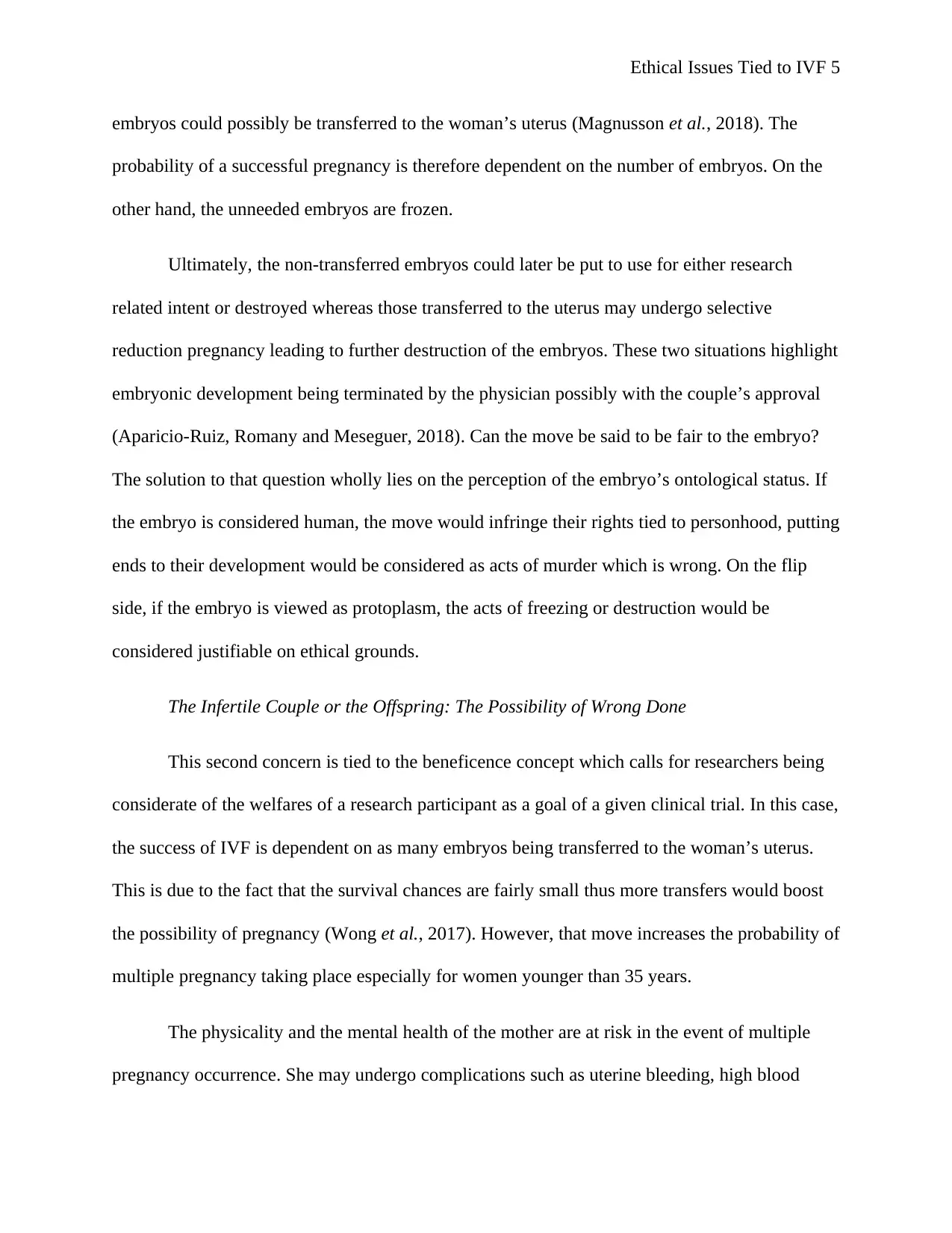
Ethical Issues Tied to IVF 5
embryos could possibly be transferred to the woman’s uterus (Magnusson et al., 2018). The
probability of a successful pregnancy is therefore dependent on the number of embryos. On the
other hand, the unneeded embryos are frozen.
Ultimately, the non-transferred embryos could later be put to use for either research
related intent or destroyed whereas those transferred to the uterus may undergo selective
reduction pregnancy leading to further destruction of the embryos. These two situations highlight
embryonic development being terminated by the physician possibly with the couple’s approval
(Aparicio-Ruiz, Romany and Meseguer, 2018). Can the move be said to be fair to the embryo?
The solution to that question wholly lies on the perception of the embryo’s ontological status. If
the embryo is considered human, the move would infringe their rights tied to personhood, putting
ends to their development would be considered as acts of murder which is wrong. On the flip
side, if the embryo is viewed as protoplasm, the acts of freezing or destruction would be
considered justifiable on ethical grounds.
The Infertile Couple or the Offspring: The Possibility of Wrong Done
This second concern is tied to the beneficence concept which calls for researchers being
considerate of the welfares of a research participant as a goal of a given clinical trial. In this case,
the success of IVF is dependent on as many embryos being transferred to the woman’s uterus.
This is due to the fact that the survival chances are fairly small thus more transfers would boost
the possibility of pregnancy (Wong et al., 2017). However, that move increases the probability of
multiple pregnancy taking place especially for women younger than 35 years.
The physicality and the mental health of the mother are at risk in the event of multiple
pregnancy occurrence. She may undergo complications such as uterine bleeding, high blood
embryos could possibly be transferred to the woman’s uterus (Magnusson et al., 2018). The
probability of a successful pregnancy is therefore dependent on the number of embryos. On the
other hand, the unneeded embryos are frozen.
Ultimately, the non-transferred embryos could later be put to use for either research
related intent or destroyed whereas those transferred to the uterus may undergo selective
reduction pregnancy leading to further destruction of the embryos. These two situations highlight
embryonic development being terminated by the physician possibly with the couple’s approval
(Aparicio-Ruiz, Romany and Meseguer, 2018). Can the move be said to be fair to the embryo?
The solution to that question wholly lies on the perception of the embryo’s ontological status. If
the embryo is considered human, the move would infringe their rights tied to personhood, putting
ends to their development would be considered as acts of murder which is wrong. On the flip
side, if the embryo is viewed as protoplasm, the acts of freezing or destruction would be
considered justifiable on ethical grounds.
The Infertile Couple or the Offspring: The Possibility of Wrong Done
This second concern is tied to the beneficence concept which calls for researchers being
considerate of the welfares of a research participant as a goal of a given clinical trial. In this case,
the success of IVF is dependent on as many embryos being transferred to the woman’s uterus.
This is due to the fact that the survival chances are fairly small thus more transfers would boost
the possibility of pregnancy (Wong et al., 2017). However, that move increases the probability of
multiple pregnancy taking place especially for women younger than 35 years.
The physicality and the mental health of the mother are at risk in the event of multiple
pregnancy occurrence. She may undergo complications such as uterine bleeding, high blood
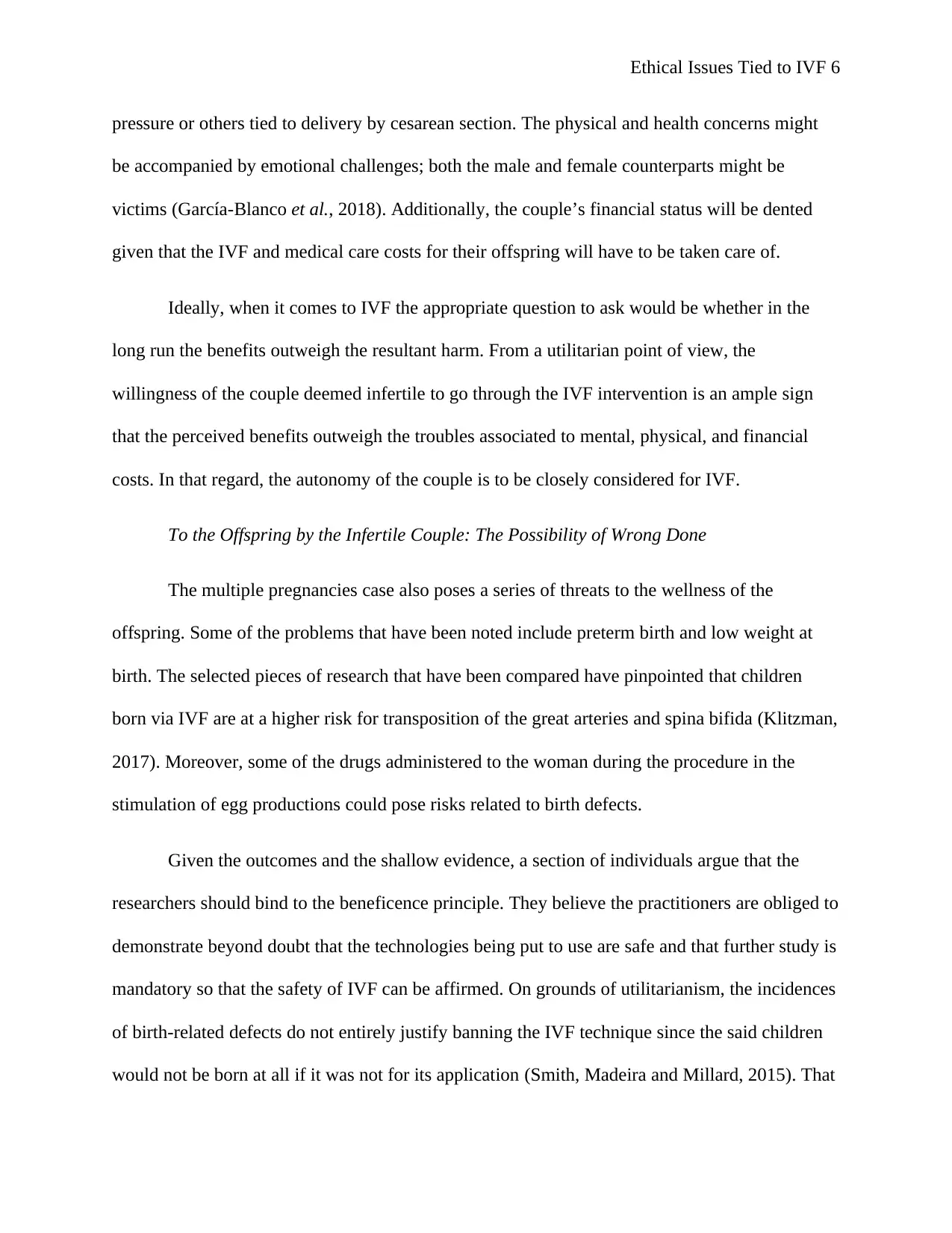
Ethical Issues Tied to IVF 6
pressure or others tied to delivery by cesarean section. The physical and health concerns might
be accompanied by emotional challenges; both the male and female counterparts might be
victims (García-Blanco et al., 2018). Additionally, the couple’s financial status will be dented
given that the IVF and medical care costs for their offspring will have to be taken care of.
Ideally, when it comes to IVF the appropriate question to ask would be whether in the
long run the benefits outweigh the resultant harm. From a utilitarian point of view, the
willingness of the couple deemed infertile to go through the IVF intervention is an ample sign
that the perceived benefits outweigh the troubles associated to mental, physical, and financial
costs. In that regard, the autonomy of the couple is to be closely considered for IVF.
To the Offspring by the Infertile Couple: The Possibility of Wrong Done
The multiple pregnancies case also poses a series of threats to the wellness of the
offspring. Some of the problems that have been noted include preterm birth and low weight at
birth. The selected pieces of research that have been compared have pinpointed that children
born via IVF are at a higher risk for transposition of the great arteries and spina bifida (Klitzman,
2017). Moreover, some of the drugs administered to the woman during the procedure in the
stimulation of egg productions could pose risks related to birth defects.
Given the outcomes and the shallow evidence, a section of individuals argue that the
researchers should bind to the beneficence principle. They believe the practitioners are obliged to
demonstrate beyond doubt that the technologies being put to use are safe and that further study is
mandatory so that the safety of IVF can be affirmed. On grounds of utilitarianism, the incidences
of birth-related defects do not entirely justify banning the IVF technique since the said children
would not be born at all if it was not for its application (Smith, Madeira and Millard, 2015). That
pressure or others tied to delivery by cesarean section. The physical and health concerns might
be accompanied by emotional challenges; both the male and female counterparts might be
victims (García-Blanco et al., 2018). Additionally, the couple’s financial status will be dented
given that the IVF and medical care costs for their offspring will have to be taken care of.
Ideally, when it comes to IVF the appropriate question to ask would be whether in the
long run the benefits outweigh the resultant harm. From a utilitarian point of view, the
willingness of the couple deemed infertile to go through the IVF intervention is an ample sign
that the perceived benefits outweigh the troubles associated to mental, physical, and financial
costs. In that regard, the autonomy of the couple is to be closely considered for IVF.
To the Offspring by the Infertile Couple: The Possibility of Wrong Done
The multiple pregnancies case also poses a series of threats to the wellness of the
offspring. Some of the problems that have been noted include preterm birth and low weight at
birth. The selected pieces of research that have been compared have pinpointed that children
born via IVF are at a higher risk for transposition of the great arteries and spina bifida (Klitzman,
2017). Moreover, some of the drugs administered to the woman during the procedure in the
stimulation of egg productions could pose risks related to birth defects.
Given the outcomes and the shallow evidence, a section of individuals argue that the
researchers should bind to the beneficence principle. They believe the practitioners are obliged to
demonstrate beyond doubt that the technologies being put to use are safe and that further study is
mandatory so that the safety of IVF can be affirmed. On grounds of utilitarianism, the incidences
of birth-related defects do not entirely justify banning the IVF technique since the said children
would not be born at all if it was not for its application (Smith, Madeira and Millard, 2015). That

Ethical Issues Tied to IVF 7
said, the utilitarian can argue that existence outweighs the harm tied to birth defects among
others.
The Community: The Possibility of Wrong Done
Applicability of IVF is often questioned given that it could alienate and put the less
fortunate in jeopardy. As previously stated, the community could argue that such moves entail
using other people as a means to a given end since advancements are made on the backs of the
less fortunate.
There is the possibility that the application of IVF technique may not harm or do wrong
to either the infertile couple, the offspring or both. Aggregately, the overall effects of IVF could
prove more harmful compared to the effects that arise from coital pregnancy. It could lead to
question whether this highlight that the use of IVF harms the community? An individual may
claim that the community is done wrong by the financial strain, IVF is a costly technique and as
such the financial resources could best be spent elsewhere (Gilmartin et al., 2018). However, this
notion fails to consider the equality fact which is a key moral doctrine. Such comprise the
autonomy of the couple in their quest to deal with the harshness of infertility, the practitioner’s
obligation to try and rescue the ailing newborn, and the dire need for further research to fine-tune
the IVF technique to entirely wipe out or counter its illness-related repercussions.
Despite the efforts being extremely costly, the society has adopted the help-out mentality.
The interest to allocate scarce resources may be slowly shifting on even expensive procedures
such as IVF. However, until we live to see that day, it is hard to pick a side between supporting
or going against the notion that IVF entirely does wrongs to the society.
said, the utilitarian can argue that existence outweighs the harm tied to birth defects among
others.
The Community: The Possibility of Wrong Done
Applicability of IVF is often questioned given that it could alienate and put the less
fortunate in jeopardy. As previously stated, the community could argue that such moves entail
using other people as a means to a given end since advancements are made on the backs of the
less fortunate.
There is the possibility that the application of IVF technique may not harm or do wrong
to either the infertile couple, the offspring or both. Aggregately, the overall effects of IVF could
prove more harmful compared to the effects that arise from coital pregnancy. It could lead to
question whether this highlight that the use of IVF harms the community? An individual may
claim that the community is done wrong by the financial strain, IVF is a costly technique and as
such the financial resources could best be spent elsewhere (Gilmartin et al., 2018). However, this
notion fails to consider the equality fact which is a key moral doctrine. Such comprise the
autonomy of the couple in their quest to deal with the harshness of infertility, the practitioner’s
obligation to try and rescue the ailing newborn, and the dire need for further research to fine-tune
the IVF technique to entirely wipe out or counter its illness-related repercussions.
Despite the efforts being extremely costly, the society has adopted the help-out mentality.
The interest to allocate scarce resources may be slowly shifting on even expensive procedures
such as IVF. However, until we live to see that day, it is hard to pick a side between supporting
or going against the notion that IVF entirely does wrongs to the society.
Paraphrase This Document
Need a fresh take? Get an instant paraphrase of this document with our AI Paraphraser
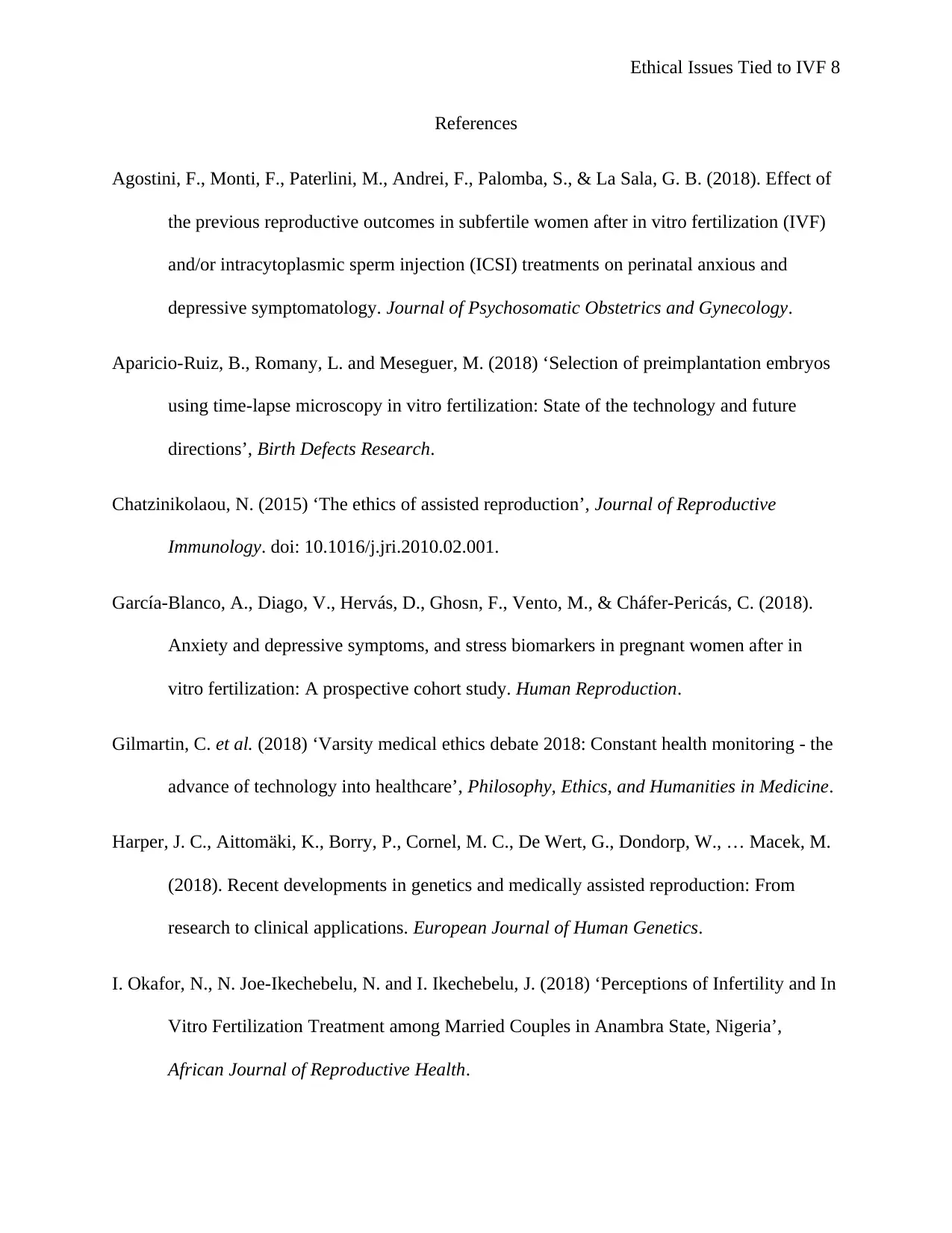
Ethical Issues Tied to IVF 8
References
Agostini, F., Monti, F., Paterlini, M., Andrei, F., Palomba, S., & La Sala, G. B. (2018). Effect of
the previous reproductive outcomes in subfertile women after in vitro fertilization (IVF)
and/or intracytoplasmic sperm injection (ICSI) treatments on perinatal anxious and
depressive symptomatology. Journal of Psychosomatic Obstetrics and Gynecology.
Aparicio-Ruiz, B., Romany, L. and Meseguer, M. (2018) ‘Selection of preimplantation embryos
using time-lapse microscopy in vitro fertilization: State of the technology and future
directions’, Birth Defects Research.
Chatzinikolaou, N. (2015) ‘The ethics of assisted reproduction’, Journal of Reproductive
Immunology. doi: 10.1016/j.jri.2010.02.001.
García-Blanco, A., Diago, V., Hervás, D., Ghosn, F., Vento, M., & Cháfer-Pericás, C. (2018).
Anxiety and depressive symptoms, and stress biomarkers in pregnant women after in
vitro fertilization: A prospective cohort study. Human Reproduction.
Gilmartin, C. et al. (2018) ‘Varsity medical ethics debate 2018: Constant health monitoring - the
advance of technology into healthcare’, Philosophy, Ethics, and Humanities in Medicine.
Harper, J. C., Aittomäki, K., Borry, P., Cornel, M. C., De Wert, G., Dondorp, W., … Macek, M.
(2018). Recent developments in genetics and medically assisted reproduction: From
research to clinical applications. European Journal of Human Genetics.
I. Okafor, N., N. Joe-Ikechebelu, N. and I. Ikechebelu, J. (2018) ‘Perceptions of Infertility and In
Vitro Fertilization Treatment among Married Couples in Anambra State, Nigeria’,
African Journal of Reproductive Health.
References
Agostini, F., Monti, F., Paterlini, M., Andrei, F., Palomba, S., & La Sala, G. B. (2018). Effect of
the previous reproductive outcomes in subfertile women after in vitro fertilization (IVF)
and/or intracytoplasmic sperm injection (ICSI) treatments on perinatal anxious and
depressive symptomatology. Journal of Psychosomatic Obstetrics and Gynecology.
Aparicio-Ruiz, B., Romany, L. and Meseguer, M. (2018) ‘Selection of preimplantation embryos
using time-lapse microscopy in vitro fertilization: State of the technology and future
directions’, Birth Defects Research.
Chatzinikolaou, N. (2015) ‘The ethics of assisted reproduction’, Journal of Reproductive
Immunology. doi: 10.1016/j.jri.2010.02.001.
García-Blanco, A., Diago, V., Hervás, D., Ghosn, F., Vento, M., & Cháfer-Pericás, C. (2018).
Anxiety and depressive symptoms, and stress biomarkers in pregnant women after in
vitro fertilization: A prospective cohort study. Human Reproduction.
Gilmartin, C. et al. (2018) ‘Varsity medical ethics debate 2018: Constant health monitoring - the
advance of technology into healthcare’, Philosophy, Ethics, and Humanities in Medicine.
Harper, J. C., Aittomäki, K., Borry, P., Cornel, M. C., De Wert, G., Dondorp, W., … Macek, M.
(2018). Recent developments in genetics and medically assisted reproduction: From
research to clinical applications. European Journal of Human Genetics.
I. Okafor, N., N. Joe-Ikechebelu, N. and I. Ikechebelu, J. (2018) ‘Perceptions of Infertility and In
Vitro Fertilization Treatment among Married Couples in Anambra State, Nigeria’,
African Journal of Reproductive Health.
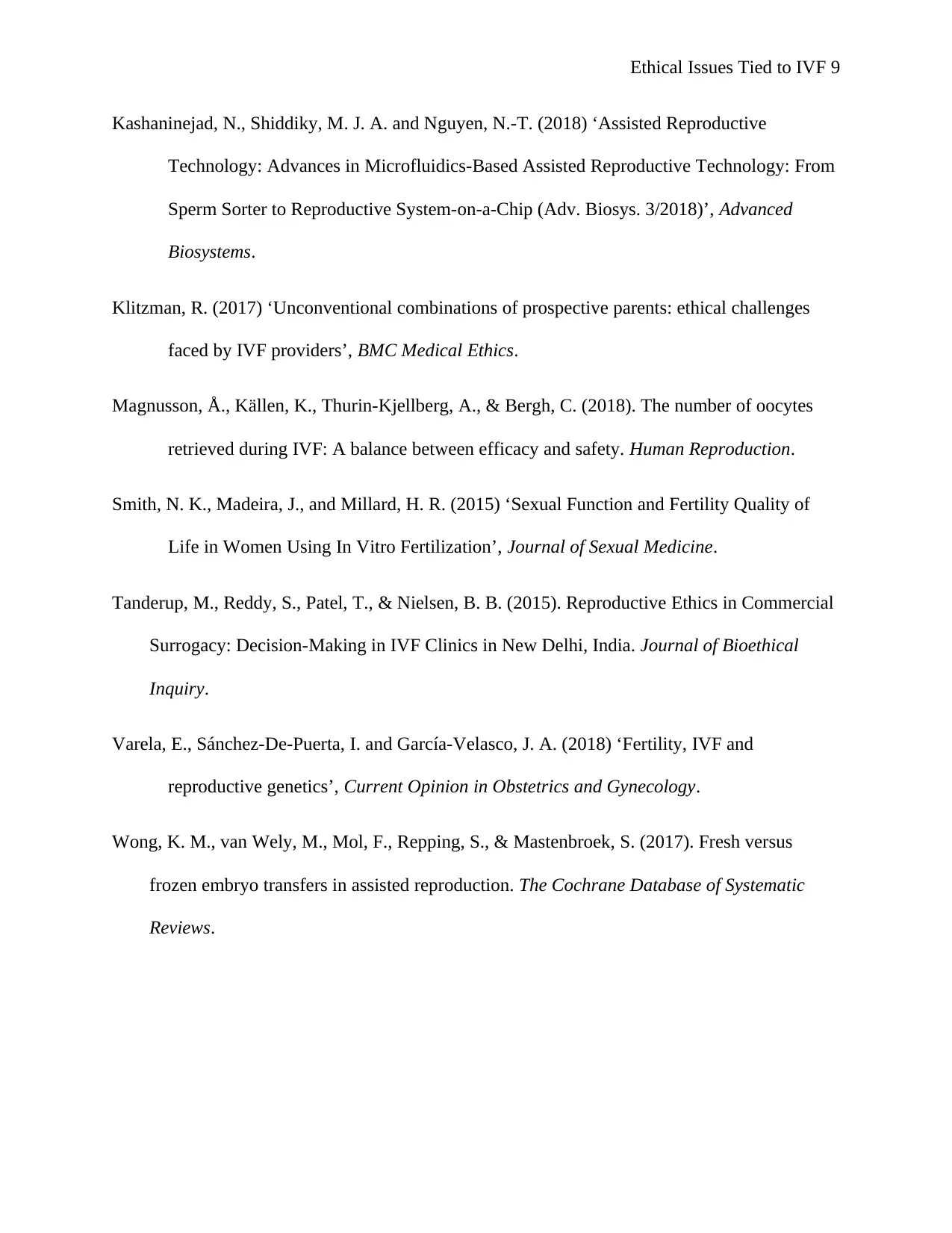
Ethical Issues Tied to IVF 9
Kashaninejad, N., Shiddiky, M. J. A. and Nguyen, N.-T. (2018) ‘Assisted Reproductive
Technology: Advances in Microfluidics-Based Assisted Reproductive Technology: From
Sperm Sorter to Reproductive System-on-a-Chip (Adv. Biosys. 3/2018)’, Advanced
Biosystems.
Klitzman, R. (2017) ‘Unconventional combinations of prospective parents: ethical challenges
faced by IVF providers’, BMC Medical Ethics.
Magnusson, Å., Källen, K., Thurin-Kjellberg, A., & Bergh, C. (2018). The number of oocytes
retrieved during IVF: A balance between efficacy and safety. Human Reproduction.
Smith, N. K., Madeira, J., and Millard, H. R. (2015) ‘Sexual Function and Fertility Quality of
Life in Women Using In Vitro Fertilization’, Journal of Sexual Medicine.
Tanderup, M., Reddy, S., Patel, T., & Nielsen, B. B. (2015). Reproductive Ethics in Commercial
Surrogacy: Decision-Making in IVF Clinics in New Delhi, India. Journal of Bioethical
Inquiry.
Varela, E., Sánchez-De-Puerta, I. and García-Velasco, J. A. (2018) ‘Fertility, IVF and
reproductive genetics’, Current Opinion in Obstetrics and Gynecology.
Wong, K. M., van Wely, M., Mol, F., Repping, S., & Mastenbroek, S. (2017). Fresh versus
frozen embryo transfers in assisted reproduction. The Cochrane Database of Systematic
Reviews.
Kashaninejad, N., Shiddiky, M. J. A. and Nguyen, N.-T. (2018) ‘Assisted Reproductive
Technology: Advances in Microfluidics-Based Assisted Reproductive Technology: From
Sperm Sorter to Reproductive System-on-a-Chip (Adv. Biosys. 3/2018)’, Advanced
Biosystems.
Klitzman, R. (2017) ‘Unconventional combinations of prospective parents: ethical challenges
faced by IVF providers’, BMC Medical Ethics.
Magnusson, Å., Källen, K., Thurin-Kjellberg, A., & Bergh, C. (2018). The number of oocytes
retrieved during IVF: A balance between efficacy and safety. Human Reproduction.
Smith, N. K., Madeira, J., and Millard, H. R. (2015) ‘Sexual Function and Fertility Quality of
Life in Women Using In Vitro Fertilization’, Journal of Sexual Medicine.
Tanderup, M., Reddy, S., Patel, T., & Nielsen, B. B. (2015). Reproductive Ethics in Commercial
Surrogacy: Decision-Making in IVF Clinics in New Delhi, India. Journal of Bioethical
Inquiry.
Varela, E., Sánchez-De-Puerta, I. and García-Velasco, J. A. (2018) ‘Fertility, IVF and
reproductive genetics’, Current Opinion in Obstetrics and Gynecology.
Wong, K. M., van Wely, M., Mol, F., Repping, S., & Mastenbroek, S. (2017). Fresh versus
frozen embryo transfers in assisted reproduction. The Cochrane Database of Systematic
Reviews.
1 out of 9
Related Documents
Your All-in-One AI-Powered Toolkit for Academic Success.
+13062052269
info@desklib.com
Available 24*7 on WhatsApp / Email
![[object Object]](/_next/static/media/star-bottom.7253800d.svg)
Unlock your academic potential
© 2024 | Zucol Services PVT LTD | All rights reserved.
